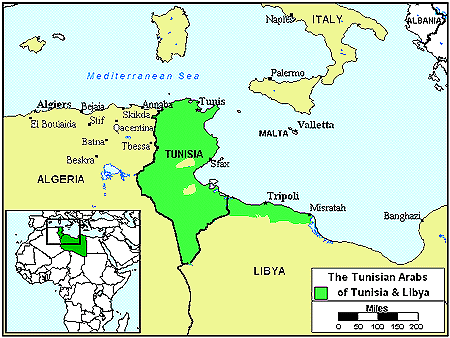|
|
Prayer Profile
The Tunisian Arab of Libya
![[IMAGE]](../images5/0826.jpg) Today, 6.5 million Tunisian Arab live in Tunisia, Libya, and France. The vast majority of them live in their homeland, Tunisia. The Tunisian Arab are an Arab-Berber population whose own culture has been greatly influenced by those of Arabs, Berbers, and the French. They have two distinguishing characteristics: a large middle class—a rarity among Arabs—and an extremely youthful population.
Today, 6.5 million Tunisian Arab live in Tunisia, Libya, and France. The vast majority of them live in their homeland, Tunisia. The Tunisian Arab are an Arab-Berber population whose own culture has been greatly influenced by those of Arabs, Berbers, and the French. They have two distinguishing characteristics: a large middle class—a rarity among Arabs—and an extremely youthful population.
In the seventh century B.C., Arab invaders overran the Tunisian Berber tribes, Tunisia's original inhabitants. This eventually led to an almost complete Islamization and Arabization of the people of that country.
In 1956, Tunisia won its independence from France, and by 1959, had successfully begun improving its national education level. However, this success was soon overshadowed by a saturated labor market. As a result, a large number of highly educated Arabs emigrated to Libya and France in search of jobs.
What Are Their Lives Like?
Libya is an Arab country in northern Africa. The vast, dry Sahara Desert covers over 90% of the country's surface. Its climate is characterized by extreme changes in temperature and very little rainfall. Libya's economy was transformed by the discovery of oil in 1959. Today, its inhabitants depend heavily on revenues generated by the oil industry, although it employs only a small percentage of the country's workers. Most Tunisian Arab, like other Libyans, are employed by service industry or agriculture.
In general, the Tunisian Arab are a friendly people who have a strong sense of family honor. They are exceptionally hospitable and courteous to those they meet. They are also extremely loyal to family and friends.
Western influences on the Arabs are becoming increasingly more noticeable. For example, many Arabs now wear Western clothing, or a peculiar mixture of Western and Arabian styles. The status of Arab women has also changed dramatically in the last twenty years. For instance, women are no longer required to wear veils in public. Also, women previously received little or no education and were confined to their homes. Today, they have the legal right to participate fully in Libyan society.
Most Tunisian Arab live in the urban areas of Libya's northwest province of Tripolitania. There, they live in apartments that are only large enough to house one nuclear family. Thus, the "extended family" is prevented from living together. Some families live in more spacious dwellings located in the city's suburban areas.
The staple dish of the Tunisian Arab is called couscous. It consists of steamed semolina served over a vegetable stew. The family eats from a common bowl, using neither utensils nor individual plates. Their everyday language is a colloquial Arabic dialect, but the French language is commonly used, especially for business and trade.
Libya remains under the leadership of Mu'ammar Ghadaffi, a maintains total control over government policy. All protests against the government are forbidden.
What Are Their Beliefs?
Virtually all Tunisian Arab are Muslim. They adhere to the teachings of the Koran and observe the five "pillars" of Islam, which include: affirming that Allah is the only god and that Mohammed is his prophet; praying; giving alms; fasting; and making a pilgrimage to Mecca.
The belief in jinnis also still exists. These are—according to Muslim legend—spirits capable of assuming human or animal form and exercising influence over people. The Arab believe that such a spirit can possess a human by entering through the brain, and can only be removed in ceremonies performed by a "seer" skilled in "jinn-lore."
What Are Their Needs?
Sunni Islam is the state religion of Libya and no form of Christian witness is permitted. Worship groups and congregations of all immigrants are strictly monitored. Prayer is the key to seeing the Tunisian Arab reached with the Gospel of Christ.
Prayer Points
- Ask the Lord to call people who are willing to go to Libya and share Christ with the Tunisian Arab.
- Pray that the laws which restrict the preaching of the Gospel in Libya will be changed.
- Ask God to strengthen, encourage, and protect the small number of Tunisian Arab Christians.
- Pray that the Lord will give these believers opportunities to share the Gospel with their own people.
- Take authority over the spiritual principalities and powers that are keeping the Tunisian Arab bound.
- Pray that God will miraculously save Mu'ammar Ghadaffi and use him as a powerful witness among Muslims.
- Pray that Jesus will begin revealing Himself to the Tunisian Arab through dreams and visions.
- Ask the Lord to raise up strong local churches among the Tunisian Arab.

Statistics
Latest estimates from the World Evangelization Research Center.
THE PEOPLE
- People name: Tunisian Arab
- Country: Libya
- Their language: Ifriqi (Maghribi)
- Population:
- Largest religion:
- Christians: <1%
- Church members: 173
- Scriptures in their own language: Bible
- Jesus Film in their own language: Available
- Christian broadcasts in their own language: Available
- Mission agencies working among this people: 2
- Persons who have heard the Gospel: 63,300 (41%)
- Persons who have never heard the Gospel: 94,400 (59%)
THEIR COUNTRY
- Country: Libya
- Population:
- Major peoples in size order:
- Major religions:
- Number of denominations: 16
© Copyright 1997
Bethany World Prayer Center
This profile may be copied and distributed without obtaining permission
as long as it is not altered, bound, published
or used for profit purposes.
![[HOME BUTTON]](../graphics/home.jpg)
![[CALENDAR BUTTON]](../graphics/calico.jpg)
![[LIST BUTTON]](../graphics/listico.jpg)
[Home]
[Calendar]
[Country List]
|